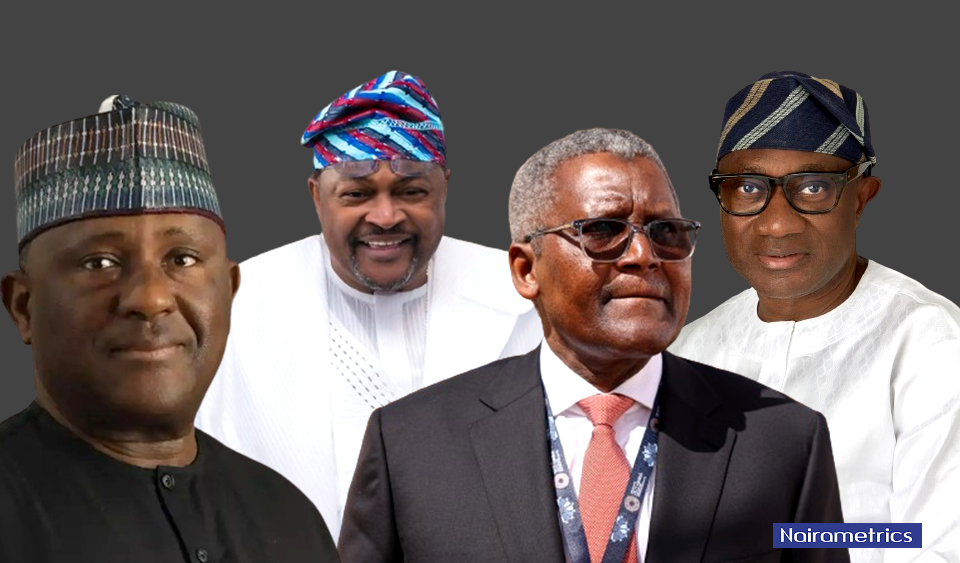Many Nigerians who have achieved great success and prosperity have significantly aided in the growth and development of their country.
Nigeria has 8,200 high-net-worth individuals, ranking third in Africa behind Egypt and South Africa, according to Henley & Partners.
The richest African man, Aliko Dangote has more money than ever before, valued at $28 billion, thanks to the completion of his long-awaited Nigerian oil refinery.
Abdulsamad Rabiu, Mike Adenuga, Femi Otedola, Tony Elumelu, Jim Ovia, and Atedo Peterside not only make money for themselves but also provide employment, showing their systemic influence in Africa’s most populated country.
The richest men in Nigeria typically amass their wealth through a mixture of industries pivotal to the Nigerian and broader African economy.
Here’s how some of these prominent figures make or have made their money:
Henley & Partners report disclosed a high number of HNWIs are drawn to the agriculture, logistics, commodities, communications, financial services, infrastructure, retail, manufacturing sectors, and residential/commercial real estate. As a result, there is a greater need for high-end real estate.
These individuals often start by identifying gaps or monopolies in key industries and then either establish new companies or buy into existing ones to compete or innovate.
Aliko Dangote: His involvement in the stock market is primarily through his conglomerate, the Dangote Group. He holds substantial shares in several listed companies: Dangote Cement: He owns about 90% of Africa’s biggest cement producer. Such a gigantic stake significantly influences his position in Nigeria’s major market. Dangote Sugar, NASCON Allied PLC, and Jaiz Bank: He also has considerable stakes in these entities, with his holdings in Jaiz Bank increasing notably in recent reports.
Tony Elumelu: While not always on the list of the richest by net worth, his visibility in the stock market is through his significant shares in United Bank, Transcorp Hotel, Transpower, African Prudential, and United Capital.
Abdul Samad Rabiu: Founder of BUA Group, which includes BUA Cement, one of the largest cement manufacturers in Nigeria. His equity in BUA Cement alone marks him as one of the key investors on the NGX.
What are their strategies?
Diversification: They often diversify into multiple systemic industries, reducing risk and expanding influence.
The richest men in Nigeria have significant stakes in the Nigerian Stock Exchange (NGX), reflecting both their wealth and their companies’ market presence.
Local Market Dominance: They aim to dominate significant portions of the local market before expanding regionally or internationally. This strategy leverages the sheer size and potential of the Nigerian market.
Infrastructure Investment: Investing in infrastructure like cement, energy, utility and supply chains is crucial for national development, giving them the ability to transfer inflationary pressure
Strategic Acquisitions and Mergers: Buying out competitors or merging with them to gain market share or technology.
Government Contracts and Relations: While not directly mentioned as a source of wealth, maintaining good relations with government entities often secures favourable business environments or contracts, especially in sectors like oil and telecommunications.
Innovation: Introducing new methods or technologies, like Dangote’s push towards Africa’s largest oil refinery, meeting local demand and aiming to export.
The wealth accumulation of Nigeria’s ultra-rich men often reflects a mix of entrepreneurial spirit, strategic business decisions, leveraging political connections, and sometimes, initial capital from family businesses or personal savings.
Their success stories are often characterized by starting with one sector and then expanding horizontally into related or entirely different industries.
